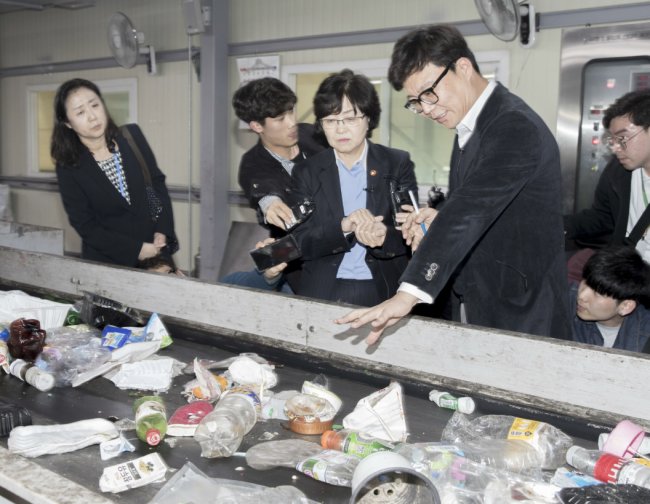Even the prime minister has appeared caught by surprise over the country’s ongoing waste management crisis.
On Wednesday, Prime Minister Lee Nak-yon berated Environment Ministry officials over a lack of measures to help ease Seoul’s growing buildup of plastic recyclables.
“What good is having a long-term plan if you can’t tackle the immediate waste collection crisis?” Lee is reported to have asked during a meeting with officials.
Lee’s wrath came just a day before Environment Minister Kim Eun-kyung was scheduled to hold a press briefing announcing the ministry’s long-term plan to improve the country‘s waste management system, including developing technologies that recover and reuse recyclables.
On Wednesday, Prime Minister Lee Nak-yon berated Environment Ministry officials over a lack of measures to help ease Seoul’s growing buildup of plastic recyclables.
“What good is having a long-term plan if you can’t tackle the immediate waste collection crisis?” Lee is reported to have asked during a meeting with officials.
Lee’s wrath came just a day before Environment Minister Kim Eun-kyung was scheduled to hold a press briefing announcing the ministry’s long-term plan to improve the country‘s waste management system, including developing technologies that recover and reuse recyclables.

Kim abruptly canceled the briefing, sending officials to Seoul districts instead to meet with waste disposal service companies over the weekend who have stopped collecting plastics due to low profitability.
China stopped importing 24 kinds of solid waste -- including low-grade plastics and unsorted paper -- as part of its broad cleanup campaign against imported waste. Since, Seoul, Incheon and Gyeonggi Province, home to about half of the country’s 50 million people, have been puzzling over what to do.
Prices of mixed paper or plastics have dropped significantly due to China’s ban that came into effect in January, which have, in turn, reduced the profitability of collecting them -- close to zero margin.
There seems to be no immediate answer to the problem, at least according to one of over a hundred recyclables collection companies that operate in the capital city and metropolitan areas.
On Sunday, Hong Do-Chan, chief management officer of RC Corporation which operates in southern Seoul, said he would continue to reject collecting them, along with many others according to Hong, in opposition to the Seoul Metropolitan Government and the Ministry of Environment.
“The local districts should step up and take plastics on their own,” Hong said. “They can’t force us to do so when there’s no money to be made collecting them.”
One option is that local governments, which are by law responsible for recycling in their districts, collect the waste banned by China from all places, including apartment complexes partnered with private collection companies.
Local governments, which have relied on local collection companies, however, lack the necessary infrastructure.
Turning to incineration or landfills as immediate responses is another option, but either would be harmful to the environment, experts say.
According to the Ministry of Environment on Sunday, a conference with district offices nationwide was held Friday and they will continue to conduct inspections at a local level to resolve the waste collection crisis.
At a national level, the Environment Ministry said it will also set up measures to reduce relevant levels of waste. According to Statistics Korea, each person in Korea produced about 98.2 kilograms of waste in 2016, ranking it top in the world.
By Bak Se-hwan (sh@heraldcorp.com)








![[KH Explains] How should Korea adjust its trade defenses against Chinese EVs?](http://res.heraldm.com/phpwas/restmb_idxmake.php?idx=644&simg=/content/image/2024/04/15/20240415050562_0.jpg&u=20240415144419)









